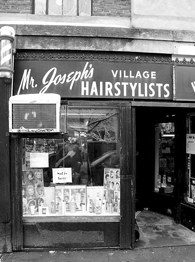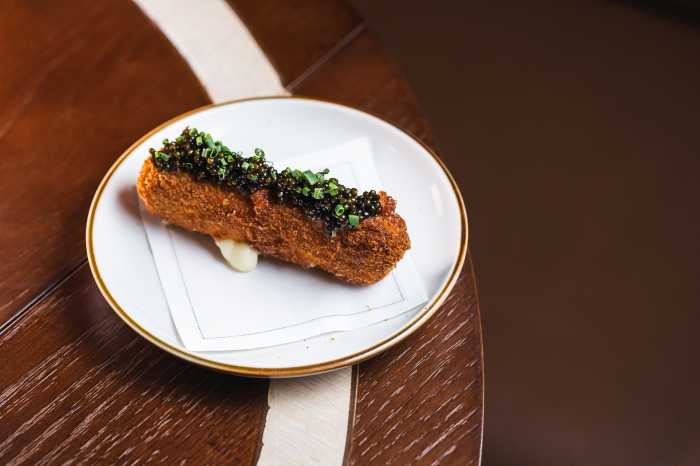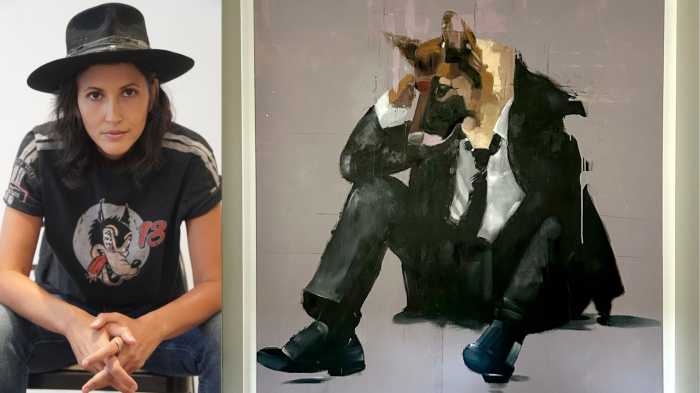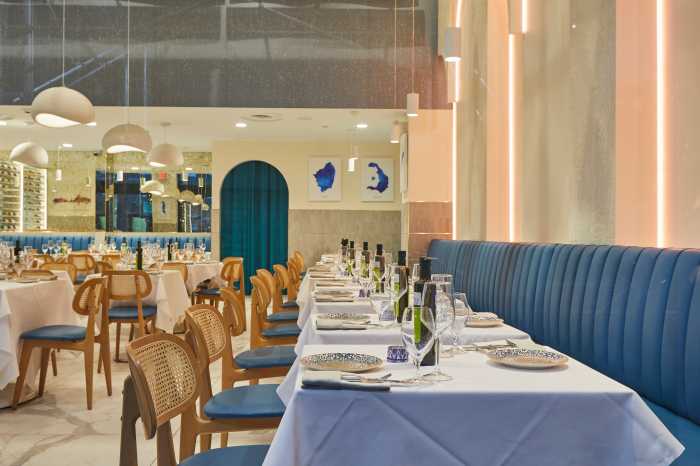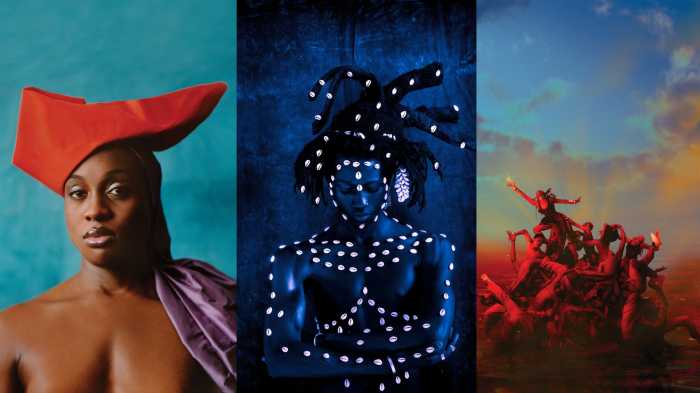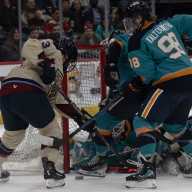By Peter von Ziegesar
It was Friday, early in December, and snow was melting in dirty piles all over the street. Cruel rays of sunlight dazzled the windscreens of the cars on Sixth Ave., and pricked through the sunglasses I was wearing. For reasons I couldn’t explain, even to myself, I’d been putting off going to the barbershop all day.
Instead, I’d worn myself out with irritating and time-wasting errands. I’d stood in line at the post office, browsed the small stack of DVD’s at the library, bought spiral notebooks at the stationary store, bought a new toothbrush at Bigelow’s, and finally, sat down for a quick meal at an Indian restaurant no wider than the breadth of my hands.
As I hurried down 11th St., I knew I had only short time left before my day ended. What strange reluctance had kept me delaying so long? I only slowed as the barbershop door came into sight.
Thirty years ago, fresh from Sicily, and barely old enough to vote, “Little” Tony Badalamenti had taken a job cutting hair at this location, at the corner of 11th St. and Sixth Ave. When his two partners left to open Mr. Joseph’s Hair Stylist on Greenwich Ave., Tony had carved out a small space behind Ray’s Pizza, which took over the corner spot, and put a sign over his door that said, “Little Tony Be Good.” The sign remained, as much an injunction to himself as a promise to everyone else. As far as I know, Tony had always done good, and always would.
On a normal day, I’d show up at the barbershop just after dropping the kids off at school. It was always the same. Tony would open the door around 9 o’clock, a takeout cup of coffee in his hand, squinting against the morning sunlight. He was a short, jowly man, with a mane of almost-white hair and a bit of a paunch that overhung his neatly pressed slacks. For a minute or two, he would stand just inside the plate-glass door, leafing thoughtfully through his appointments calendar and lining up the combs and scissors on his shelf.
One by one, the other barbers would arrive, holding their coffees before them like rocks and tossing their cigarettes to the sidewalk. First would be Sal Costanza, of Palermo, a quiet, thoughtful, monklike man, who I always thought looked a little like Tony — perhaps not quite as jowly or as short. Then came John Badalamenti, a cousin from Toretta, Tony’s home village, and finally, Eddy Becovic, who was actually Yugoslavian, but after six years working for Tony, spoke Sicilian like a native.
As each man squeezed through the door, Tony would give him a kiss on the stubbled cheek and a heartfelt greeting in dialect that sounded almost like a prayer.
By now, I’d have settled on the black vinyl bench in back, flipping through copies of Playboy and Maxim that Tony unashamedly left around for his male customers to read. On the radio, the golden oldies station would play, “Oo ah oo ah oo oo Kitty! Tell us about the boy from New York City!”
Tony would gesture to me to sit down, and throw a polyester wrap around my shoulders.
“God bless you,” he would say, running his fingers over my scalp. “So lucky. Such a beautiful head of hair. Look at this, so thick, so rich, and not a speck of gray!”
“Come on, Tony,” I’d say back, “I’m almost as old as you are. Start cutting, you’ll find the gray.”
“Never mind,” he’d say. “The way you talk. The way you hold yourself. Cream, it always rises to the top. You’ll see what I’m talking about.”
While Tony’s scissors clicked and skittered around my ears, I’d gaze with admiration at his eclectic wall display: the pictures cut from girly magazines taped cheek-by-jowl, so to speak, with snapshots of his wife and daughter in their Staten Island home, the postcard from Palermo with its five beautiful naked sandy fannies all in a row, the soap opera celebrity standing outside the barbershop with his arm around Tony, who in the photograph looked somehow shorter and squintier than he did in real life. Above all, and everywhere, there was the smirking visage of Tony’s idol, Elvis Presley, scrawny and shy at Sun Studios, getting sheared as he entered the Army or crooning and fat in a Vegas silver jumpsuit. Over Tony’s mirror the King’s famous swivel hips scraped back and forth, counting off the seconds as they dangled from a large plastic souvenir clock.
Tony always made you feel like a member of royalty who’d just happened to stop in. His way of talking was old-fashioned, laced with compliments, built on ancient concepts of respect. One morning I’d brought in my son, a normally fractious and intractable 4-year-old, and was amazed to observe him sitting bolt upright in his chair, stunned into politeness and pop-eyed silence by the low intonations of masculine talk over his head, the pervasive smell of alcohol and hair oil around him, while Tony cut his hair.
In the end, Tony and I discussed what all fathers discuss in this city: our kids, our wives, the obscene prices of real estate, the shameful changes taking place in the neighborhood. Often he’d conclude my haircut by saying, “You come back the shop, about 5 o’clock. We’ll sit down and have a cordial. You and me.”
He would nod and pull the sheet from my shoulders and hand me an oversized mirror so I could check out the back of my neck. “A small glass. You will like it. We will talk like men.”
Tony’s offer had been incredibly generous, I reflected now, as I paused outside his barbershop, hand on the doorknob. I couldn’t understand why I hadn’t ever taken him up on it. Perhaps it was not too late to ask him, even this afternoon, to enjoy a leisurely glass of grappa with me. I would mention it.
After the bright-lit street, the barbershop interior seemed as dark as an aquarium. My ears pricked in sudden adjustment, and soon I realized why. The radio, usually tuned to the oldies station, was off, and raw silence buzzed inside the store like a broken street-pole transformer.
Eddy and John sat in a couple of barber chairs, flicking their cigarettes and talking quietly in dialect. Sal stood in the back, his hand over the telephone, a long dirty phone cord snaking its way around behind him. I couldn’t see Tony; maybe he’d gone out to snag a cup of coffee or put a quarter in the meter for his car.
I sat down and took off my jacket. A copy of a car magazine was sitting on the bench, and I picked it up. No one said anything to me. Several minutes went by.
Finally, I put down the magazine and stood up. “If you’re busy,” I said.
Sal looked up, I think seeing me for the first time. “I can take you,” he said. He put down the phone and gave Eddy a gentle push. Eddy slid off the chair.
“I’ll come back.”
“No. Sit down.”
He drew the cover around my shoulders and picked up the scissors. I saw that his eyes were tired and raw, red around the rims.
“Everything all right?” I asked.
“Yeah, sure,” he said. He flexed the scissors and started clipping. “You don’t know?”
I shook my head.
“Tony passed away two hours ago.”
The back of my neck prickled. “What?”
“In the hospital. In a little bit, we go pay our respects.”
“What was it?” I asked, in a state of shock.
“Lymphoma. It didn’t take long, I tell you. One, two, three months, he’s gone. A young man, just 54.”
Tony’s cousin stuck his hand through the backroom door, fingers spread.
“Five minutes!” he said.
“Make it 10,” Sal said, nodding to me. “He’s a friend.”
“The neighborhood is going to miss him,” I said at last, struggling to make this new piece of information fit it into my world.
“Sure,” Sal shrugged. “Tony had a big heart. He gave to everybody.”
Tony’s cousin came out of the back again. He tossed Eddy a heavy lump of plastic tangled in cable. Eddy caught it one-handed.
“What’s this?”
“Eddy, figure out how to use the answering machine, will you?”
“It’s broken,” Eddy said.
“Fix it.”
Eddy said something in dialect. But he took the cable and started unwinding it.
“You remember after 9/11?” said Sal. “Tony kept the shop open all night to give haircuts to the firemen and the doctors over at St. Vincent’s. Never charged anybody.”
While Sal clipped away, I thought of my peregrinations around the neighborhood, to the post office, the bookstore. What had I known? What had I been avoiding? The thought that Tony, a man I knew, was lying in a hospital bed, drawing his last breath? How could I have understood that?
“Car’s here!” said John. “Let’s go.”
Sal whipped off the sheet and handed me a mirror.
“What do you think?”
“Good,” I said. I handed him a couple of bills. Once again, I noticed Sal’s resemblance to Tony. Well, after all, they’d grown up in Sicily within miles of each other.
“Let’s go.”
Eddy gave up trying to attach the machine. We all stood in the melting snow and shook hands, while Sal locked the door.
“You come back,” Sal said to me just before they drove off. “Everything will be the same. You’ll see.”
I did go back. Somehow I never found another place that could cut my hair as well. For a year or two, Tony’s wife let things go on as they were, except that Sal moved his scissors and electric shears over to Tony’s old chair by the door and stayed on as manager.
The last time I went to Little Tony’s was something like the two-year anniversary of Tony’s death. It was another December day, and this time bitter cold, when I walked in the door. All of Tony’s pictures were still up, but the first thing I noticed was the music. Instead of “Sherry” or “Tears of a Clown,” the radio was pumping out something low and liquid and strange, like a kind of disco from another planet. A woman’s voice on the track kept whispering loudly against the beat in a language I didn’t understand.
I took a quick look around and saw a very ancient, white-haired lady having her hair cut in the back. “I can’t stand this music,” she shouted to me. “It sounds like two ironing boards slamming together!”
Just then a handsome man with a thin beard handed me a card. I took it and read, “Igor’s Unisex Salon.”
“Where’s Sal?” I asked, sitting down in the barber chair.
“Sal’s not here anymore.” The phone rang and he picked it up. “Little Tony Be Good,” he said. “Eddy’s unavailable. Why don’t you just come down and check it out? We got a good thing going on.”
Back on the sidewalk, I rubbed my hand over my fresh scalp. Igor gave a good haircut, but I was going to have a hard time with the music. The feeling just wasn’t there anymore.
A few months later, I was walking down Greenwich Ave. and noticed a small paper sign taped in the window of Mr. Joseph Men’s Hairstylists, by the barber pole. “Sal is here,” was all it said. I went inside. “Up on the Roof” by the Drifters was playing on the radio.
I sat down in a barber chair. Sal spread the sheet over me.
“What happened?” I asked.
thevillager.com



